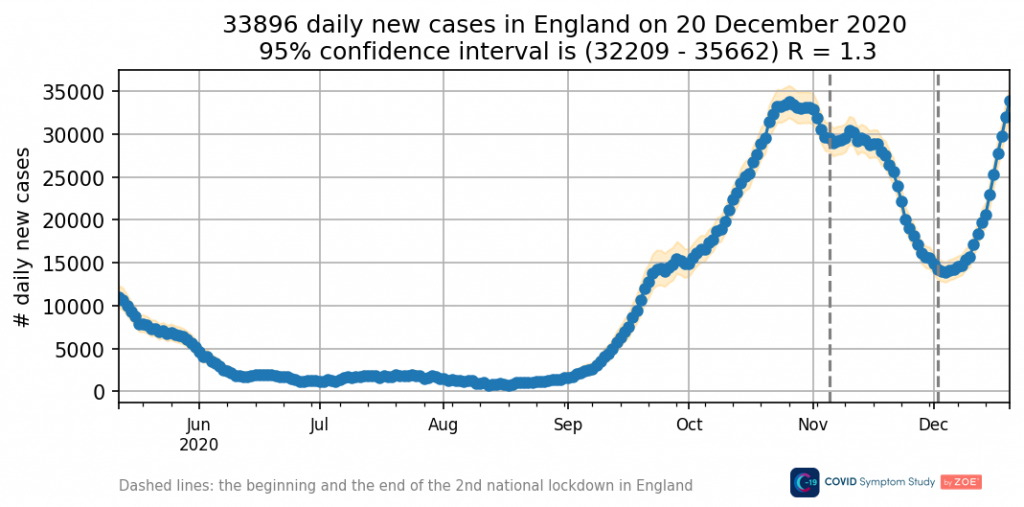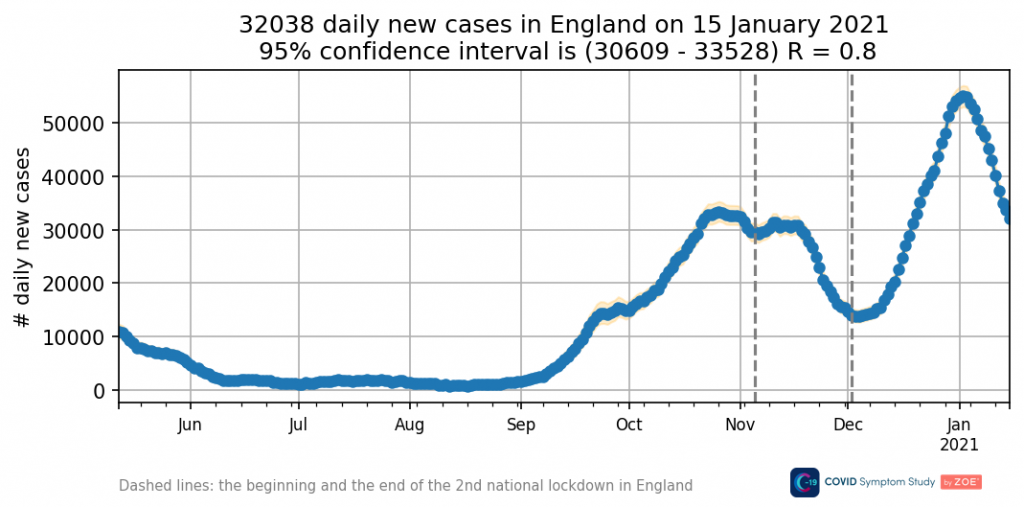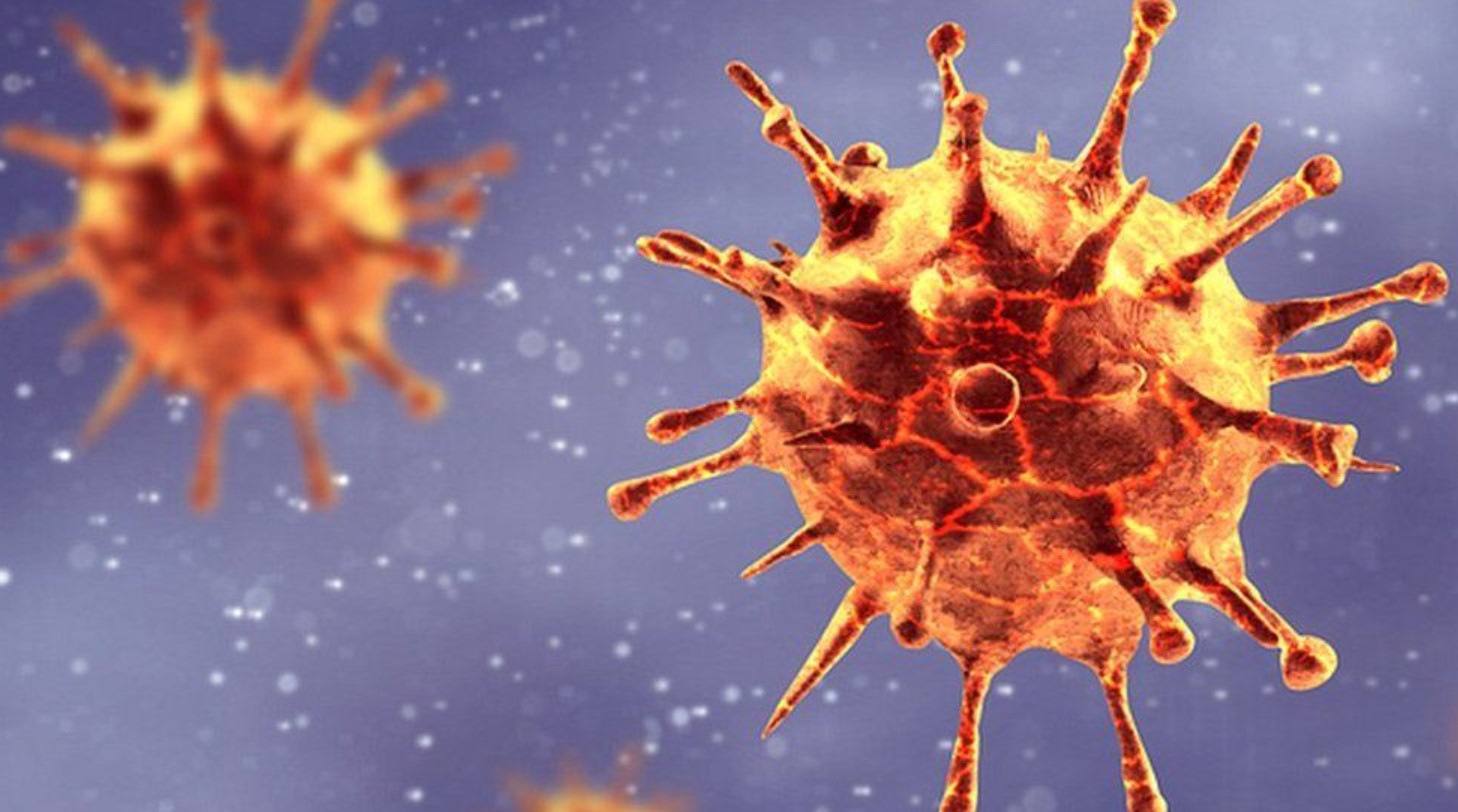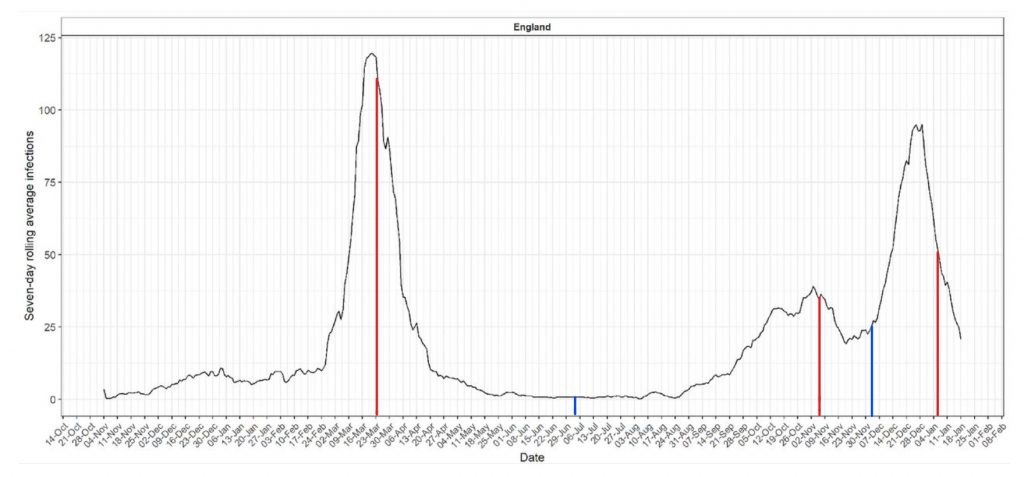I wanted to come back to the question of what causes COVID-19 occasionally to have explosive outbreaks. We’ve had two in England so far. Using the graph below (produced by Imperial’s REACT study using symptom-onset reports from their antibody survey, so no PCR tests involved) we can see when they occurred. The first occurred from around February 25th to March 19th 2020, ending after about three and a half weeks, as abruptly as it began. The second got going around December 2nd, and ended – once again abruptly after three and a half weeks – on December 25th. As the lines below indicate, these starts and stops bear no relation to when lockdowns were imposed or lifted (the red and blue lines respectively).
Given that (as we can see) Covid was around in England throughout the winter of 2019-20 (arriving in November according to this graph) and was also simmering away in the autumn of 2020 without taking off, a key question is what triggers the beginning and end of the more explosive outbreaks?
Another way of putting the same question is: why does COVID-19 occasionally, Jekyll and Hyde-like, transform from a relatively gentle, not very infectious disease into a super-infectious disease for a few weeks, before suddenly returning once more to its largely benign form?
Perhaps surprisingly, Covid in England has only been in ‘Hyde’ form for about seven weeks in total so far, with the R rate (the speed at which the epidemic is growing) only going significantly above one (indicating an exponentially growing epidemic) for around three and a half weeks in February/March 2020 and three and a half weeks in December 2020. The rest of the time it’s been up and down in different regions, particularly in the autumn, but there’s been no nationwide surge. What, then, on those two occasions triggered the disease to become briefly so much more infectious across the country?
It’s tempting just to say it’s seasonal, and indeed it does appear to be. But not predictably so, given the virus has been around now for two winters and two springs, yet broke out in its first spring but not its second, and in its second winter but not its first. Besides, calling it seasonal only begs the question as to what triggers seasonal outbreaks of infectious diseases, a question which is widely debated.
We would expect the difference in infectiousness during surges and outside them to show up in the secondary attack rate (SAR – the proportion of contacts an infected person infects), and sure enough it does. Public Health England (PHE) estimated the SAR of the Alpha (British) variant at around 15% between November 30th and December 20th during the winter surge, going a bit higher in some regions. Afterwards, in the period January 5th to March 7th, it went down to 11%. (More recently it went down to 8%.)
This may not seem like a big difference in absolute terms, but in relative terms it’s a considerable drop to around two thirds of the value between December and January. This is, not coincidentally, the same kind of change that we see in R over the same period. According to the ZOE Covid symptom study, R was about 1.3 during the December surge and around 0.8 during the January decline (see charts below) – again, around two thirds of the value. (Note that R will also include people infected with no known contacts, say via aerosols in a supermarket or in a restaurant from an infected person at a different table. Since such anonymous transmission likely increases during a surge as there is more virus around, this may explain why R changes a bit more than the SAR.)


This suggests that the difference between Covid surging or not comes down to whether each infected person passes it on to closer to 10% of their contacts or 15%. Or in other words, depends on only around 5% of a person’s exposed contacts being more susceptible to infection. Since we can assume about 90% of a person’s contacts are usually protected by their immune system in some way (not just antibodies but innate immunity and T cells as well), this means just one in 18 of a person’s contacts needs to succumb to infection who wouldn’t normally to result in an outbreak.
What could produce this effect in a population? Two possibilities present themselves: a seasonal weakening of the immune system that would result in around one in 18 more people succumbing to infection on exposure; or a change in the virus that makes it more able to evade the initial defences of around one in 18 people and develop into infectious, symptomatic disease.
With regard to the first possibility, it is now well-established that the human immune system involves numerous seasonal cycles (with “more than 4,000 protein-coding mRNAs in white blood cells and adipose tissue” having “seasonal expression profiles”) that go a long way to explaining why people are more susceptible to contagious diseases like flu and Covid during the winter months. However, by itself that wouldn’t account for why outbreaks are suddenly and irregularly triggered, rather than occurring in, say, regular fashion during the winter according to the stages of the cycle.
Perhaps then the second possibility, a change in the virus, plays a part. This would come in the form of new variants that can evade the initial defences of around one in 18 additional people. Thus, on this theory, it was the arrival of the Alpha variant in winter that pushed enough people over the threshold to trigger an outbreak.
If this is right, then what ends the outbreak a few weeks later is when enough people become immune through infection to restore the temporarily disturbed herd immunity and push the SAR back down close to 10% and the R below one. (Another factor that could play a role in increasing the SAR temporarily is vaccination, perhaps by suppressing the immune system briefly, or by increasing exposure through the vaccination programme, or in some other way.) We can reasonably expect that this iterative process will not go on forever, and SARS-CoV-2, like other seasonal viruses, will before long be supplanted by a new dominant virus.
The lack of outbreak in winter 2019-20 might be due to competition with flu, which was subsequently out-competed as it faded in spring. Or maybe it was new variants arriving in February and March 2020 which triggered the spring surge – the genomic data is a little hazy.
The upshot? Primarily, further confirmation that COVID-19 is a seasonal disease to which most people have some immunity and which relies on new variants to produce enough disruption to population immunity to produce short but sharp outbreaks. Further confirmation, too, that models that predict mass infection of a highly susceptible population whenever restrictions are lifted are fundamentally misconceived, hence why they have been invalidated time and again. (Texas has now gone almost four months since reopening without a surge, and likewise Florida and other open states.)
Confirmation, in other words, that Covid is not, and never has been, a reason to impose harmful restrictions on society.













To join in with the discussion please make a donation to The Daily Sceptic.
Profanity and abuse will be removed and may lead to a permanent ban.